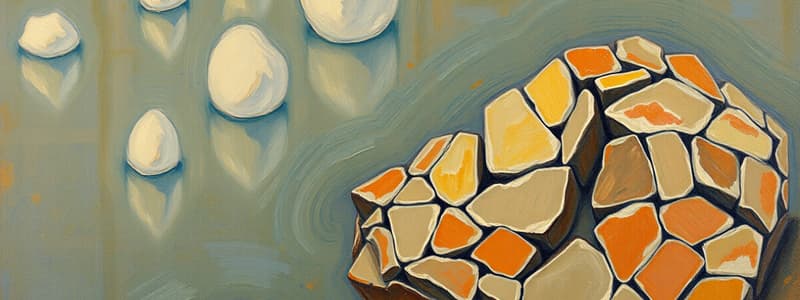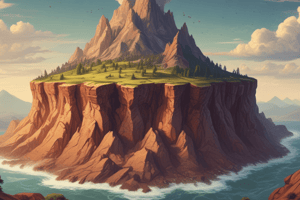Podcast
Questions and Answers
Which of the following is NOT a major classification of rocks?
Which of the following is NOT a major classification of rocks?
- Metamorphic
- Sedimentary
- Chemical (correct)
- Igneous
How are rocks essential in building materials?
How are rocks essential in building materials?
- They are biodegradable and environmentally friendly.
- They are derived from aggregates of mineral grains. (correct)
- They can only be used for decorative purposes.
- They can conduct electricity efficiently.
What is one way that rocks impact our daily lives?
What is one way that rocks impact our daily lives?
- They are primarily used in food production.
- They are used as fuel sources.
- They provide the solid structure of the Earth. (correct)
- They act as natural purifiers for water.
What is not an example of products made from rock materials?
What is not an example of products made from rock materials?
What does the classification of igneous rocks signify?
What does the classification of igneous rocks signify?
Which type of rock is created through the alteration of existing rocks by heat and pressure?
Which type of rock is created through the alteration of existing rocks by heat and pressure?
What is a primary reason rocks are considered fundamental to civilization?
What is a primary reason rocks are considered fundamental to civilization?
Which of the following describes sedimentary rocks?
Which of the following describes sedimentary rocks?
What process describes the transportation of sediments to lower levels?
What process describes the transportation of sediments to lower levels?
Which type of rock is characterized by the process of solidification of molten rock?
Which type of rock is characterized by the process of solidification of molten rock?
Which process involves the breakdown of rocks at the Earth's surface?
Which process involves the breakdown of rocks at the Earth's surface?
What is the term for fragments of rocks, minerals, or organic materials that accumulate over time?
What is the term for fragments of rocks, minerals, or organic materials that accumulate over time?
Which of the following rocks is considered a metamorphic rock?
Which of the following rocks is considered a metamorphic rock?
What is the primary characteristic of sedimentary rocks?
What is the primary characteristic of sedimentary rocks?
What term describes the process where sediments are packed together under pressure?
What term describes the process where sediments are packed together under pressure?
What defines a mineral compared to other substances?
What defines a mineral compared to other substances?
What is the process called when rocks change due to high temperature and pressure?
What is the process called when rocks change due to high temperature and pressure?
At what temperature range does rock typically begin to melt into magma?
At what temperature range does rock typically begin to melt into magma?
Which type of igneous rock is formed when magma cools quickly on the surface?
Which type of igneous rock is formed when magma cools quickly on the surface?
What distinguishes intrusive igneous rock from extrusive igneous rock?
What distinguishes intrusive igneous rock from extrusive igneous rock?
What is lava in the context of rock formation?
What is lava in the context of rock formation?
Which of the following correctly describes the interior of the Earth?
Which of the following correctly describes the interior of the Earth?
What are the dominant minerals in the continental crust?
What are the dominant minerals in the continental crust?
Where does oceanic crust primarily form?
Where does oceanic crust primarily form?
Which of the following best describes a mineral?
Which of the following best describes a mineral?
Which mineral is used to produce plaster of Paris?
Which mineral is used to produce plaster of Paris?
Which of the following minerals can serve as a source of iron?
Which of the following minerals can serve as a source of iron?
Which of these options is considered a rock-forming mineral?
Which of these options is considered a rock-forming mineral?
Which mineral is commonly used in fertilizers?
Which mineral is commonly used in fertilizers?
What is the primary process that transforms sedimentary rock into metamorphic rock?
What is the primary process that transforms sedimentary rock into metamorphic rock?
Which of the following is an example of an igneous rock?
Which of the following is an example of an igneous rock?
What process leads to the formation of sedimentary rocks?
What process leads to the formation of sedimentary rocks?
Which best describes the term 'gneiss'?
Which best describes the term 'gneiss'?
What leads to the melting of rocks in the rock cycle?
What leads to the melting of rocks in the rock cycle?
Which of the following best defines sedimentary rocks?
Which of the following best defines sedimentary rocks?
Why is the rock cycle referred to as a 'cycle'?
Why is the rock cycle referred to as a 'cycle'?
What type of rock is formed when limestone undergoes metamorphism?
What type of rock is formed when limestone undergoes metamorphism?
Flashcards are hidden until you start studying
Study Notes
Types of Rocks Overview
- Rocks form the solid structure of Earth, providing raw materials for construction, tools, and more.
- There are three main types of rocks: igneous, sedimentary, and metamorphic.
Igneous Rocks
- Formed from the solidification of molten rock, called magma.
- Two categories:
- Extrusive igneous rocks, which cool quickly on the Earth's surface (e.g., basalt).
- Intrusive igneous rocks, which cool slowly beneath the surface (e.g., granite).
Sedimentary Rocks
- Created through the deposition of sediments, which can include fragments of other rocks, minerals, and organic material.
- Formation involves processes like erosion, weathering, compaction, and cementation.
- Example: Limestone, formed from the accumulation of marine organisms.
Metamorphic Rocks
- Formed when existing rocks are altered by heat, pressure, or chemically over time.
- This process can create new minerals and rock structures.
- Example: Marble, which forms from the metamorphosis of limestone.
Rock Cycle
- Represents the continuous transformation of rocks through various geological processes.
- Key processes include:
- Weathering: Breakdown of rocks at the Earth's surface.
- Erosion: Transportation of sediments to lower elevations.
- Compaction and Cementation: Clumping together of sediments to form rocks.
- Melting: High temperatures causing rocks to turn into magma.
- Solidification: Previously molten magma cooling to form igneous rocks.
Key Terms
- Erosion: Movement of soil/sediments.
- Magma: Hot, molten rock beneath Earth's surface.
- Mineral: Naturally occurring inorganic substance with a specific composition.
- Compaction: Pressing sediments together, often under additional layers.
- Cementation: Minerals filling the gaps between sediment particles to bind them.
Importance of Rocks
- Vital for ecosystem stability and everyday life, providing the materials for buildings, roads, and other infrastructure.
- Serve as natural resources for various industries, including construction, manufacturing, and art.
Examples and Applications
- Gneiss: A metamorphic rock known for its banding patterns.
- Obsidian: A glassy, black volcanic rock, classified as igneous.
- Conglomerate: A sedimentary rock composed of rounded fragments cemented together.
Activities and Assessments
- Classify various rock samples and describe their formation.
- Trace the rock cycle, identifying different processes and rock types.
- Engage in vocabulary exercises to solidify understanding of key geological terms.
Studying That Suits You
Use AI to generate personalized quizzes and flashcards to suit your learning preferences.




